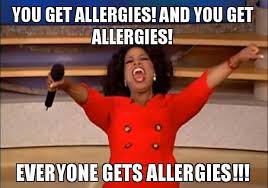The Do's and....*ACHOO* Don'ts of Seasonal Allergies (for Parents)
- May 1, 2019
- 3 min read

During those dreary, long Wisconsin winters, we dream about the beauty of spring... BUT, it seems that each year we forget about the sniffles, sneezes, and itchy, watery eyes that, for many kids (and adults), come along with it. Well, before you run to your local drug store to clear the allergy shelves, keep reading!
What to do...
1. Get in front of the symptoms
Since allergy medications typically take some time to kick in and work their magic, start giving them at the first sign of an allergy-related sniffle, and check with your pediatrician about when to stop. Remember: It's always better to be proactive rather than reactive!
2. Be Mindful of Outdoor Exposure
We know, we know, getting outside, absorbing the sunlight (safely) and being active is ABSOLUTELY essential for your health, but if your child has seasonal allergies, it really kills the fun. Making sure that you're keeping your eye on your child's symptoms during outside time, washing up and changing clothes when coming back inside, and trying to keep windows closed during peak pollen counts are all ways to lessen the severity of the symptoms.

3. Try a holistic approach
There are many ways to avoid medications if that's not your style or if your child doesn't tolerate them. Things like a steamy shower, a little Vicks VapoRub under the nose or on the chest, or a well-cleaned, saline solution filled Neti Pot can work wonders for symptom relief. You could also try out an air purifier. Have another alternative therapy? Comment below!
4. Talk to the school
While your child is yours for the summer, seasonal allergies creep in way before they're let out on break. If your kiddo has bad allergies, make sure their teachers and the school nurse know! That way they can watch for symptoms, be mindful of classroom practices like opening windows, keep some extra tissue on hand, and/or give your child a spritz of Flonase/a dose of Claritin if needed (as instructed by you and your pediatrician, of course).

5. Be prepared year-round
Allergies aren't just isolated to spring and summer. In fact, there are many things during each season that can cause allergy symptoms to flare. See some of the most common causes for each season below!

What NOT to do...
1. Overuse medication
Many parents of children with more severe seasonal allergies tend to overdo it when it comes to medication. We get it! You just want your kiddo to feel better. Unfortunately, some of the common medications that are used for seasonal allergies (nasal steroids like Flonase, oral antihistamines like Benadryl, and decongestants like Children's Sudafed PE) can be damaging in large and too-frequent dosages. Common symptoms of overuse can range from nosebleeds to drowsiness, but can escalate depending on the use. If you're concerned about your child's allergies or have questions about allergy medications, just give your pediatrician a call!
2. Mistake the symptoms
Many parents struggle to identify whether their child is experiencing symptoms of seasonal allergies or if it's a bug they picked up at school. The unfortunate thing? They're both pretty common. We made the infographic below for you to use as a guideline... Print it, share it, help yourself and your fellow parents!

3. Isolate your child
If you're considering holing your kiddo up in the house, and putting them in a makeshift hyperbaric chamber, please give us a call first. We understand the urge to protect your child from their environmental allergens, but good symptom control and consistent follow-up with a pediatrician can make a huge difference in their quality of life!
4. Leave it untreated
We absolutely respect your right to make decisions for yourself and your family, but there are some definite risks associated with untreated allergies including:
Asthma
Sinus Infection
Ear Infection
Headaches/Migraines
Gastrointestinal Problems
Difficulty Sleeping
Difficulty Focusing
Mood Disorders/Behavioral Problems

5. Make assumptions
If your child is 10 and hasn't had a sneeze in their life, TELL US YOUR SECRET, but also don't dismiss it as impossible. Although very common, allergies don't necessarily occur in everyone, and they can certainly be outgrown, but they can also develop at any stage in life--although it's more common in children and young adults.
If you have any questions or concerns about yours or your child's allergies, give us a call. We are always here to support you through those sneezes and wheezes!
Now, sit back and enjoy this small collection of allergy season memes!

















Comments